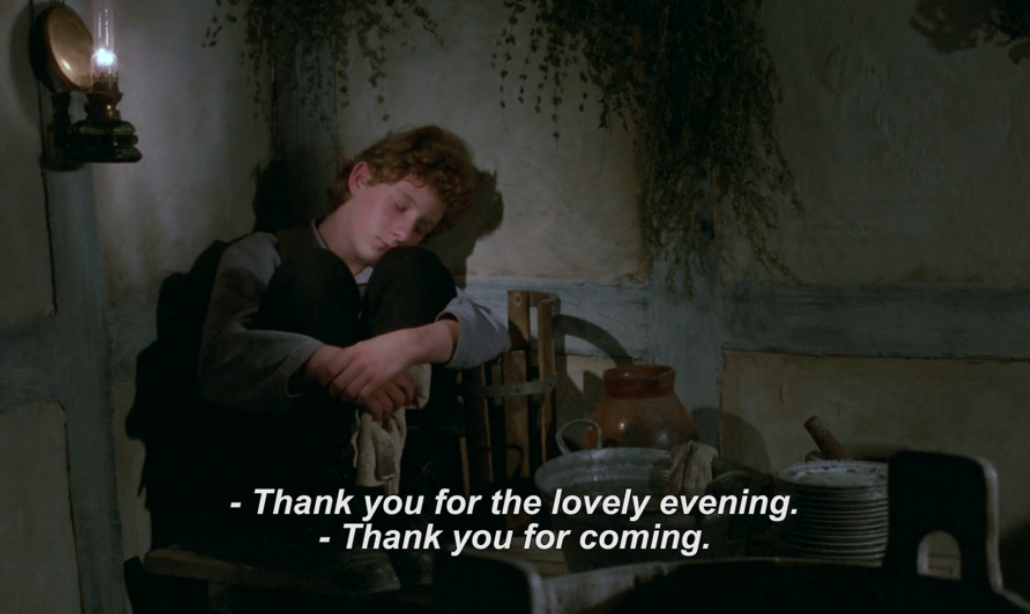This weekend's topic, currently streaming on HBOMax and Criterion Channel, was chosen by readers. This article contains spoilers so if you've never seen the film, correct that first.
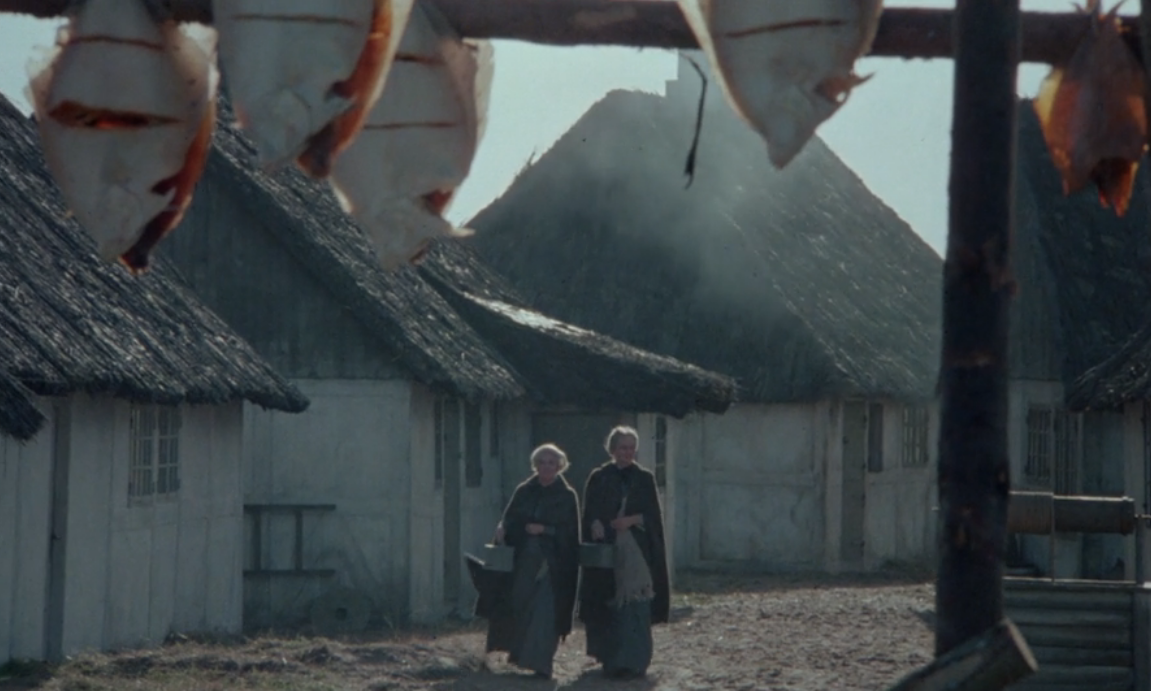 for such a delicious movie, the first shot of people and food isn't very appetizing!by Nathaniel R
for such a delicious movie, the first shot of people and food isn't very appetizing!by Nathaniel R
How far does the "foodie" movie subgenre stretch back? It's difficult to tell from the internet alone, which tends to think movies of all genres began in the 1980s; online "best of all time" lists are of little use when you're curious about film history. We know at least that the subgenre was in full swing by the 1990s with arthouse hits such as Like Water for Chocolate, Eat Drink Man Woman, and Big Night arriving semi-annually. Was the watershed moment, at least for US moviegoers, bout a half a year stretch between the fall of 1987 and the spring of 1988? In that time the hilarious Japanese "ramen western" Tampopo (1985) was slowly collecting its fult following and Denmark's Babette's Feast was a hit at arthouse theaters and took home the Oscar.
Whether or not Babette's Feast was the first truly popular foodie title with movieogers, it was at least a grand appetizer or sensational first course for the now robust subgenre...
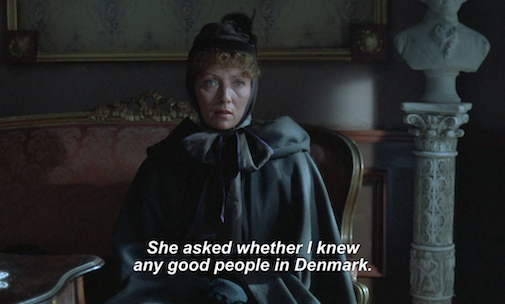 Babette in France, in flashback
Babette in France, in flashback
The most recent entry into the foodie movie canon was The Menu, 2022's mouthwatering dark comedy about murderous Chef Slowik (Ralph Fiennes). While Chef Slowik would surely despise this entire subgenre of movies -- especially Ratatouille's "anyone can cook" theme -- perhaps Babette's Feast would have been a guilty pleasure? At the very least it's easy to picture Slowik being taken offguard and then admiring the private artistry of Babette (Stéphane Audran) herself. That's the essentially artistry of this movie's audience arc, too, rather than the more familiar experience of enjoying a character arc.
But we're getting ahead of ourselves.
1st course "Potage à la Tortue" (Turtle Soup) served with sherry and heads turning
Babette is introduced/glimpsed only briefly in the first scene. Still, her presence is so peculiar that we're told in narration that it requires explanation. Sure, we'll play along. Why do two ultra-religious spinster sisters in a remote Danish village have a French maid anyway? You see, only fate could have brought Babette here. Well, fate and two ill-fated quasi romances, one for each spinster sister, Martine (Birgitte Federspiel) and Filippa (Bodil Kjer).
Martine is courted briefly and timidly as a young woman by a Swedish cavalry office whose military service takes him far away, while a Parisian opera star attempts to seduce Filippa who ultimately rejects him. Babette doesn't return until the thirty-minute mark when she arrives soaking wet and destitute at the sisters' door, sent by that same Parisian opera star who had never forgotten the religious sisters. Babette doesn't speak a word of Danish at first but soon becomes a well-liked if quiet "exotic" neighbor to everyone in the small village.
2nd course (hors d'oeuvre): Blinis Demidoff (Buckwheat Pancakes with Caviar & Sour Cream) served with Champage and Familiar Faces
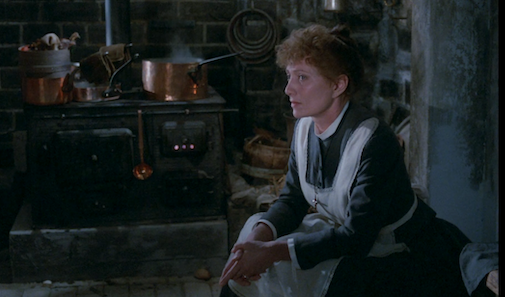
The role of Babette was originally offered to Catherine Deneuve, the most iconic French actress of the 20th century. In hindsight --given the film's international success and staying power -- it seems foolish that she turned it down. Still, the secretive nature of the character might have made her read like a cipher on paper. For almost the entire running time we learn nothing of Babette beyond her tragic circumstances (she fled France destitute during a civil war that killed her family and one peculiar annual ritual (a French lottery ticket is renewed on the regular). Naturally the second part pays off and, first twist, she wins that lottery. The sisters assume she'll quit working as their maid given her sudden riches but, second twist, she doesn't but merely takes a bit of time off and returns to prepare a festive dinner for the sisters (who are planning to celebrate their deceased father).
The role isn't much to work with for much of the running time though some scenes are instantly more interesting retroactively after the lmovies third and fourth twists. Babette, as it turns out, was a famous chef in Paris before the tragedy that brought her here and, shockingly, she's spent her entire lottery winnings on this lavish feast and is at film's end as destitute as when we first met her. Why did she do it? Audran's humble performance doesn't pull focus -- she allows Babette to remain a quiet unobtrusive "maid" for nearly the whole picture -- but her quiet performance does amuse more in retrospective or second viewing.
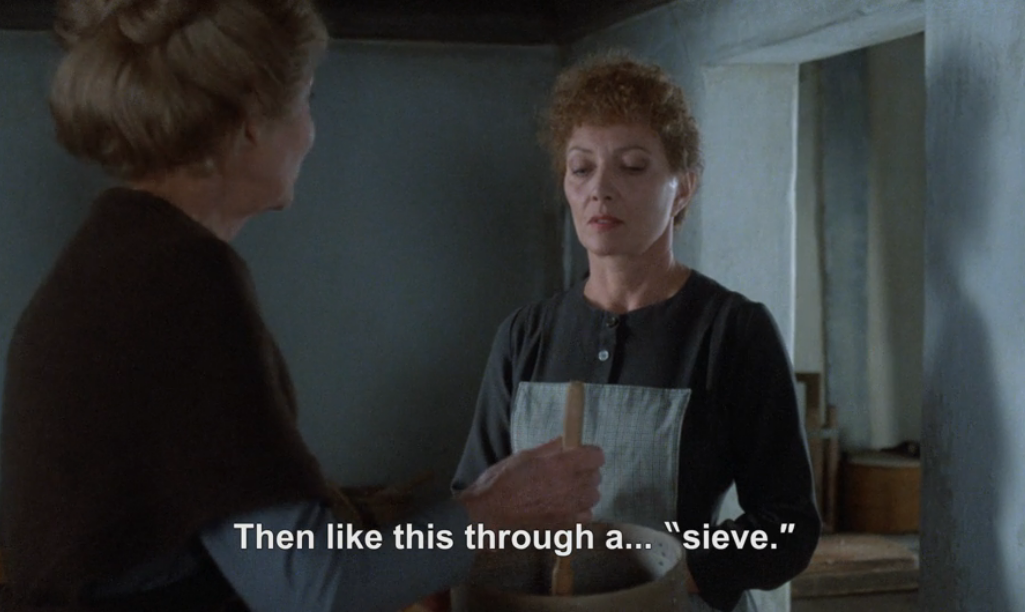 Is Babette disgusted by the cooking "lesson" or trying to learn the language? Both!
Is Babette disgusted by the cooking "lesson" or trying to learn the language? Both!
Note for example, how Audran doesn't give away the game when the sisters "teach" her how to cook early in the film. It's one of the film's best jokes (in hindsight). The sisters are instructing their new maid with a very unappetizing "bread and ale soup". Babette hides whatever she might think of the actual cooking by way of the language lesson that's happening simultaneously, focusing on the words themselves and repeating each ingredient in Danish.
There's also a subtle telling shift in Audran's performance once Babette has decided to cook the feast for the film's third act -- which even bleeds a bit (though not as much as you might hope) into the journeyman filmmaking. She's still the warm and accomodating "maid" content to stay in the background but she moves and speaks with more purpose and authority. The giant feast, which looks impossible to pull all off, is all coming quite naturally even as she sweats in the heat of the kitchen and the exhaustion of the seven course miracle. In short, Audran knows how to make the film's "twist" both a surprise and an 'of course' inevitability.
[Cast Trivia: The big meal and Audran, a star of French classics like Les Biches, Coup de Torchon, and The Discreet Charm of the Bourgeoisie, aren't the whole show. The film's cast is full of elderly but familiar faces from Scandinavian cinema including Jarl Kull and Bibi Andersson (famous from Ingmar Bergman pictures) as well as actors from Carl Theodor Dreyer movies. The Bodil Awards, Denmark's own version of the Oscars, are even named after Bodil Kjer who plays Filippa! We suspect the awards were named after her somewhere down the line though as she won the very first Best Actress prize for Jenny and the Soldier (1947)]
3rd course: Quail in Puff Pastry Shell with Foie Grass and ruffle Sauce. Served with Pinot Noir and Comedy
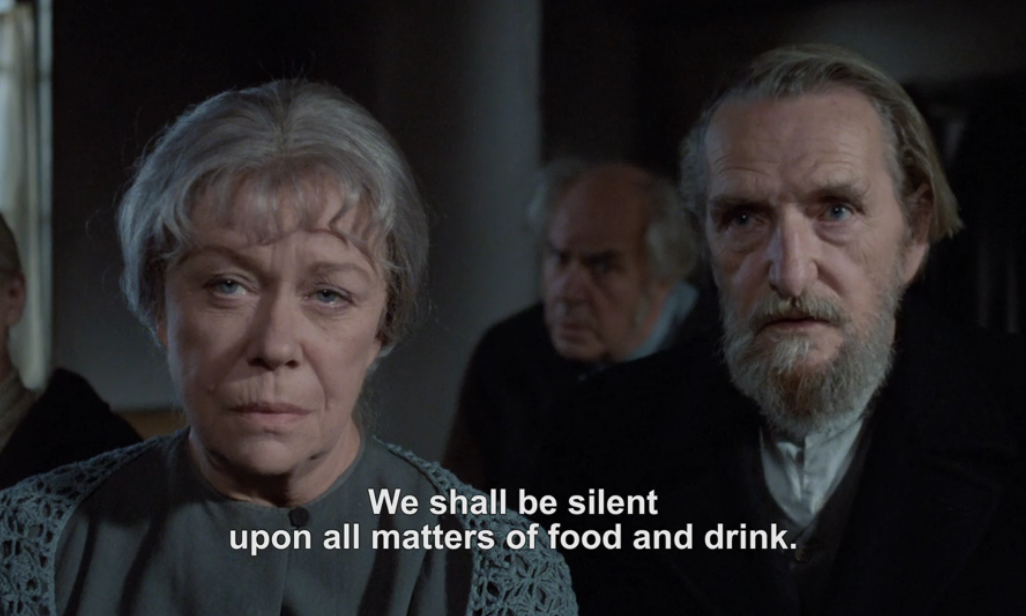
Babette's Feast stakes so much of its power on its third act, that the film might have deflated like a souffle, if anything about the timing of the grand meal was off. Thankfully the final act is strong and swift enough to elevate all that came before it as worthy slow-burn set-up for its spiritual and sensual punchline. The multi-course feast is not just extravagant and mouth-watering but comically delicious too. The poe-faced pious crowd, tries to resist the decadent meal as if it will lead them straight to hell (via France, which borders that inferno, don'cha know). So the meal becomes a comedy of avoidance as the diners try not to enjoy the food or even speak of it! The key factor in destroying their conspiracy of silence is the presence of Martine's young would-be lover, returned as an old decorated general, who has tasted these gourmet dishes before and can't stop raving about them. Finally the non-stop pleasure of the flavor parade and definitely the copious expensive booze, is too much for them to resist. They all enter a state of not just bliss (that would be too reductively crass for this film's endgame) but fully redeemed. They smile. They kiss. They make peace, forgiving each other of past grudges as they digest.
The final lines, just like the results of the meal, pull us away from gentle comedy to spiritual peace. Babette argues that no artist is ever poor (despite all evidence in her life to the contrary). Filippa's response is about the riches that await Babette in heaven "How you will enchant the angels!".
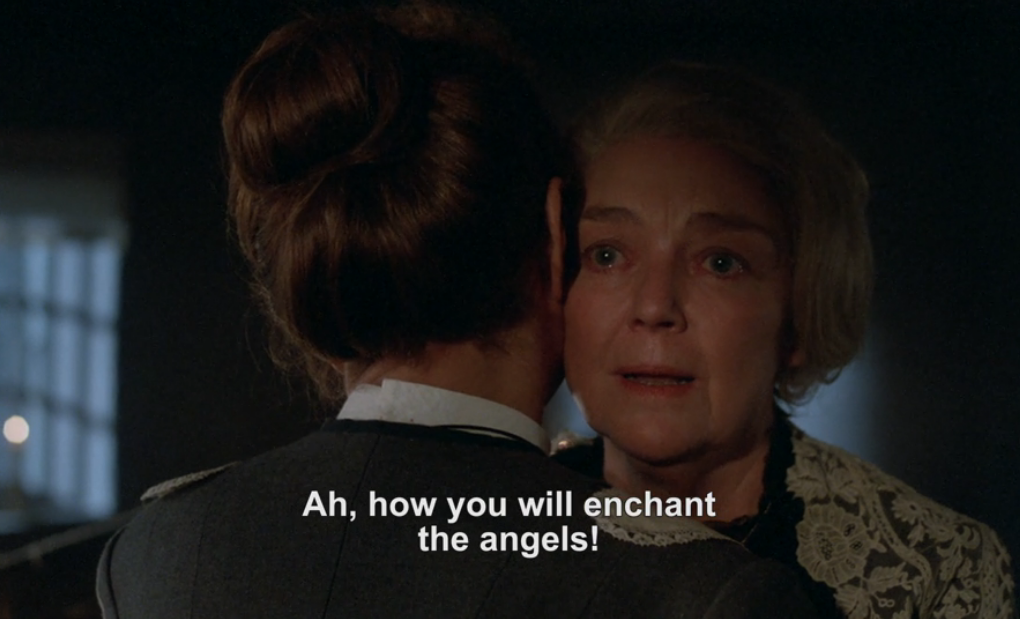
It should be horribly overwrought and unbearably corny. But Babette's Feast knows just how to lead us to this moment, guard down, fully satisfied... and stuffed.
4th course: Endive salad and Afterthoughts.
Babette's Feast is a fine reminder that short stories are among the best sources for film adaptations. It's easy to picture it adapted today as a mini-series given current storytelling norms, but it's just about the perfect length at 102 minutes.
The film isn't so much simple as beautifully distilled, with broad but gentle strokes where fine detailing work could theoretically be. All in all it plays like a comforting but wistful bedtime story. Gabriel Axel's screenplay doesn't really have the artistry to let you forget that you're "watching" a book, given the narration, but that's more feature than bug and not remotely the goal. There's something pure and fairy-tale ready about Isak Dinesen's original story that welcomes this overt "storytime" approach.
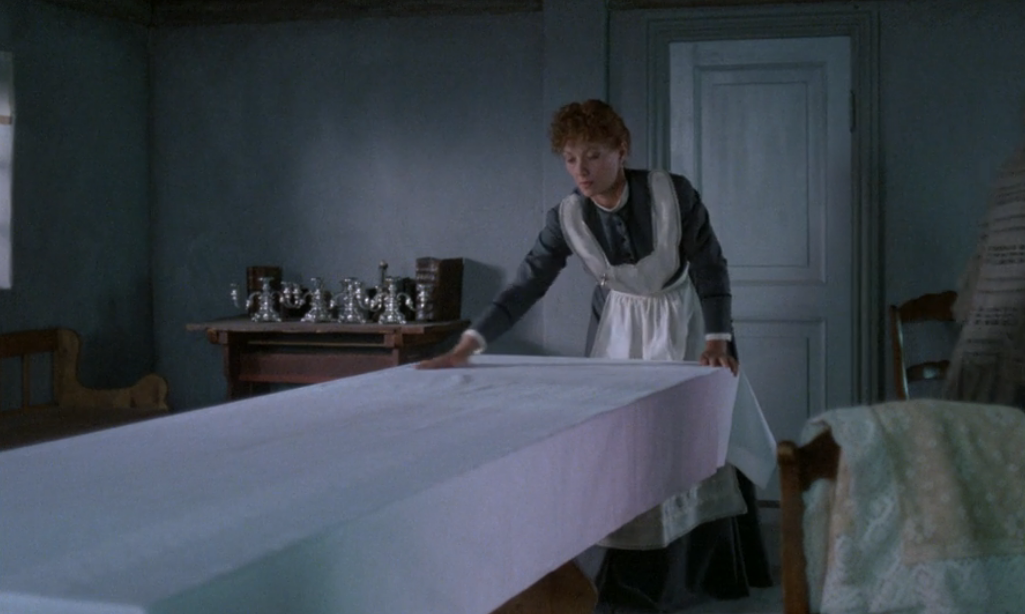 Best Shot (!) if we were still playing that game. Look at the beautiful simplicity... and the rich possibility of the titular meal that's about to hit.
Best Shot (!) if we were still playing that game. Look at the beautiful simplicity... and the rich possibility of the titular meal that's about to hit.
5th course: Rum Spongecake with Figs, Candied Cherries. Served with Champagne and The Oscar Race.
The Best International Feature Film race of 1987 (then called "Best Foreign-Language Film") was a fairly exciting one as golden competitions go. The nominees were:
- Au Revoir Les Enfants (France)
- Babette's Feast (Denmark)
- Course Completed (Spain)
- The Family (Italy)
- Pathfinder (Norway)
The category featured three famous directors: Louis Malle (Au Revoir Les Enfants) a well known auteur in Hollywood due to both buzzy English language films (Oscar-nominated Atlantic City, and the controversial Pretty Baby) and bonafide French classics (Oscar nominated Lacombe Lucien, and Elevator to the Gallows); Jose Luis Garci (Course Completed) who had won the category earlier that decade with Begin the Beguine and would go on to become Spain's most nominated director (4 nominations); and Italy's Ettore Scola (The Family) who was enjoying his second nomination after the Loren/Mastroianni hit A Special Day from 1977. There was also a then-unusual participant via Norway enjoying only its second nomination for the excellent wintry adventure Pathfinder. Though we don't remember this race specifically (we were nascent Oscar fanatics at the time) signs suggest that Louis Malle's critically revered Au Revoir Les Enfants was originally the one to beat. It opened just a month before Babette's Feast in the US and both were arthouse hits in a virtual tie as far as box office grosses went (only Pedro Almodóvar's Women on the Verge of a Nervous Breakdown which opened in November and compete at the next Oscar ceremony was a bigger subtitled hit with US moviegoers in 1988).
6th course: Assorted Cheeses & Fruits with Sweet Wine/Victory
In the end Babette's Feast would triumph, winning Denmark its first of four Oscars in the category. What put it over the edge in a presumably tight race? Was it the 1980s fervor for Karen Blixen/Isak Dinesen (see also Out of Africa's 7 Oscar haul)? The comfort food cinema aspects (which in this case was both literal and figurative)? Or merely timing and recency bias as it was hot in arthouses at the time?
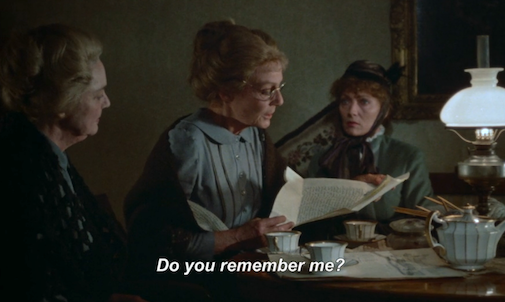 Are you old enough to remember this Oscar race? If so do share what you thought at the time!
Are you old enough to remember this Oscar race? If so do share what you thought at the time!
7th course: Coffee & Cognac ... The Film's Afterlife
Whatever the cause of the Oscar win -- and it's usually a combination of factors, it hasn't aged poorly as decisions go. Though Au Revoir Les Enfants remains critically beloved, Babette's Feast remains popular, staying in the public consciousness far longer than subtitled hits usually do. In the 35 years since its release its inspired plans for English language remakes (which didn't materialize), an Off-Broadway stage play, and still prompts restaurants and enterprising chefs to recreate its titular meal for special events or just for fun.
That was a lot of article to digest. Pun intended. Did you watch Babette's Feast this week to play along here. Who would you have voted for that Oscar year?
